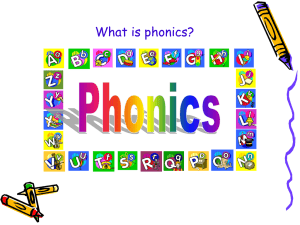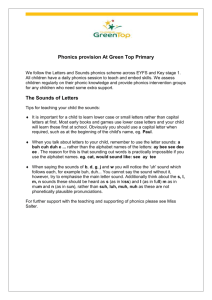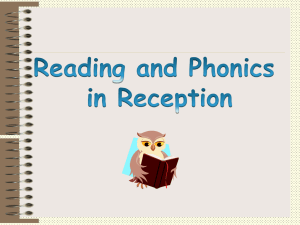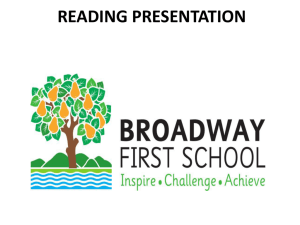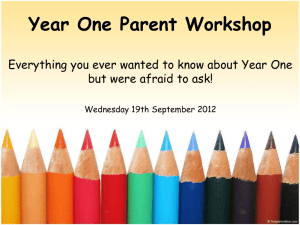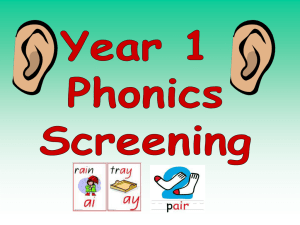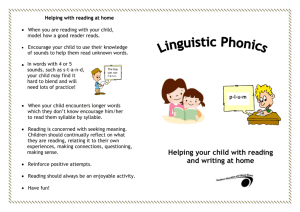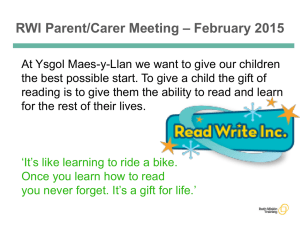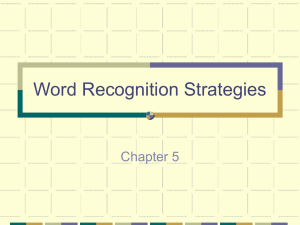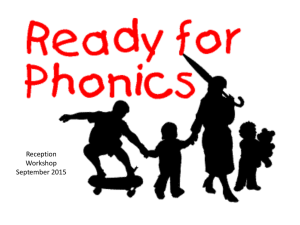Phonics workshop Sept15
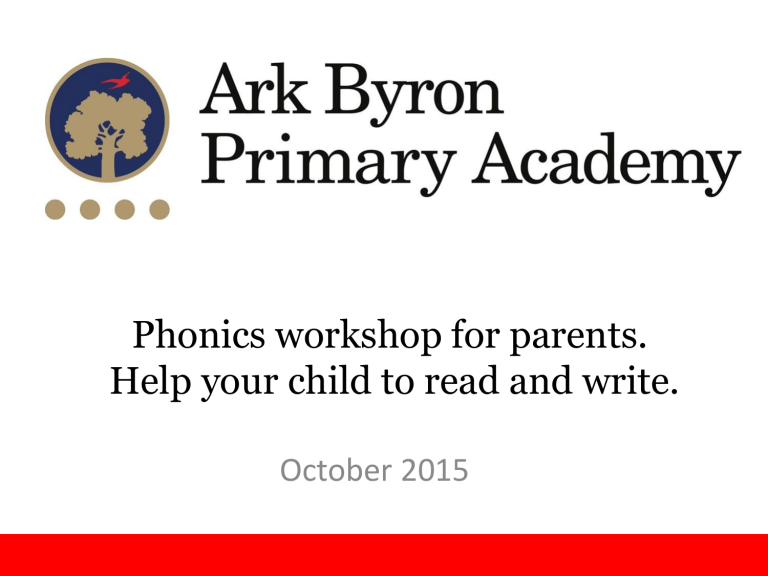
Phonics workshop for parents.
Help your child to read and write.
October 2015
Children who read at home do better at school
• Read fluently
• Write confidently
• Speak articulately
“Reading is the one ability, that once set in motion, has the ability to feed itself, grow exponentially and provide a basis from which possibilities are endless.” Michael Morpurgo
The “expected” reading and writing level for the end of reception:
• Read and understand simple sentences. Use phonic knowledge to decode regular words and read them aloud accurately. Also, read some common irregular words. Demonstrate an understanding when talking with others about what they have read.
• Use their phonic knowledge to write words in ways which match their spoken sounds. Also write some irregular words. Write sentences that can be read by themselves and others .
Daily Phonics lessons
Progression in phonics
Writing – formulating own ideas, encoding, segmenting, forming letters, scribing sounds, punctuating .
Reading – speedy decoding and understanding of others’ ideas
Blending and segmenting – oral practice
Learning and using sounds
Why we use Read Write Inc phonics ..
• A complete literacy programme - systematic and structured.
• Meets the demands of the new national curriculum, giving your children the best chance of success in the national tests (Year 1).
• One-to-one tutoring - no child is left behind.
• Storybooks align with the sounds learnt in class.
Some technical knowledge
• Phonics = the sounds in our language.
• Watch the sound pronunciation guide.
• Now it is your turn to practise…
Challenge..
It would be easy if we only had to learn set
1 and set 2 sounds.
How does phonics help?
• Say “hello” to Fred.
Fred can only talk in sounds...
He says “c_a_t.” Not cat.
We call this Fred Talk.
Watch Ruth Miskin explains Fred Talk .
(“Blending” and “segmenting”)
Using Fred Talk at home
“What a tidy r-oo-m!”
“Where’s your c-oa-t?”
“Would you like some c-a-ke?”
“Please get me a s-p-oo-n.”
“Time for b-e-d!”
• Tip: keep to single syllable words.
Online options
• www.ruthmiskintraining.com/parents
• www.teachyourmonstertoread.com
• www.phonicsplay.co.uk/HelpingMyChild
• www.readingeggs.co.uk
Home Learning
Reading and writing phonics practice
We want your child to:-
• Recognise the sound
• Say it clearly
• Write it accurately.
Helping with writing
Formation matters.
Pay attention to the pencil grip – we are aiming for tripod grip. Some children are not ready.
Tips:
Hold a piece of paper with ring and little fingers,
Play a ball walking game,
Use play dough, and scissors.
It is too easy for my child
• It should be easy but..
• Read Write Inc groups children from a very early stage.
• We need to have a solid foundation.
• Children that are ready will have a reading book sent home with a reading record book.
• Practising with a familiar book is helpful - add expression, discuss the book.
Reading at home
• Encourage your child to look at print as you walk to school and in shops.
• Share books at home – in your home language is great.
• Once your child brings home a reading book please read listen to your child read at least four times in a week.
Tips to help
• Listen to your child four times a week at least. Keep it short and happy!
• It is good to read a familiar book – builds confidence, use expression.
• Use the reading record.
• Keep the book in the school bag! We change once a week.
Pointing
• Encourage pointing.
• This helps your child to look at the word and match what they say to the word.
• Finger under the word!
What if they get stuck?
• an easy word – look at the first letter (e.g. pin)
• sound it out (if you think they know the letter sounds).
• a hard word – tell them. Don’t let them struggle.
• always let them use the pictures to help.
(But you can add to it by saying – yes that is a
“tent” and if you look at the word here you can see it starts with a “t” so that makes sense.)
Red words
• Some words cannot be sounded out.
• There are some that just need to be learned:
E.g. the, to, go, is, he, she.
• We will give you lists of words and help on how to support your child with learning those words.
Help your child learn how to look after books
• Turn pages carefully.
• No writing on books.
• Keep books in the book bag.
• We have to charge for lost/spoiled books.
Quality talk helps reading and writing
• Keep your story times,
• Talk through the day – think out loud,
• Encourage sentences,
• Build vocabulary.
Build vocabulary
• Big: Vast, enormous, massive,
• Small: Minute, tiny, miniscule
• Sad: Miserable, downcast, glum, forlorn
• Happy: Over the moon, walking on air, thrilled, ecstatic
• Noise: Din, racket, commotion, hullabaloo
• Kind: Thoughtful, big-hearted, considerate
Enjoy!
• Please tell us how your child is doing.
• Please ask us if you need help.
